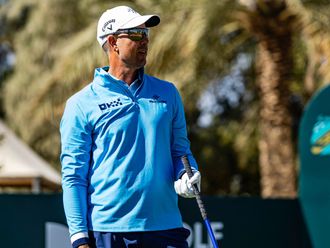Abu Dhabi: In 1974, George Foreman was a glowering bull of a man.
He unleashed fury on Muhammad Ali in their legendary ‘Rumble in the Jungle’ world heavyweight boxing showdown — and was left bitter and broken by his stunning defeat.
Yet, in 2014, vengeance and vehemence have been replaced by sheer, unadulterated love, as Foreman gushes endless outpourings of praise about his erstwhile conqueror.
In keeping with his benevolent reincarnation, he hailed Ali as “the greatest man I’ve ever met” and “simply beautiful” in an exclusive interview with Gulf News to mark the 40th anniversary of the ‘Rumble in the Jungle’ on Thursday.
Foreman was quoted in 1984 as saying he “loved” Ali after becoming a Christian minister following his boxing retirement in 1977 (he made a comeback 10 years later).
But, in 1974, he was left angry and angst-ridden at the loss of his title to Ali and the failure to secure a rematch.
How does he explain such a stunning transformation from simmering hatred to hero worship, after seeking to pulverise Ali in the ‘Rumble in the Jungle’?
“I was able to walk away from boxing and, after a few years, you look for good memories and exciting times in your life,” Foreman, who has become a successful entrepreneur with a grill that has sold more than 100 million units, told Gulf News. “I’d become a minister and I had nothing but memories. The first time I remember meeting Muhammad Ali, my heart was beating fast. And he came up as if he knew me and said: ‘Hey George’. It made me so happy. I’d not met anyone else in my life who was that exciting.”
Foreman admired Ali’s stance against the Vietnam War — he refused to be conscripted to the US military in 1967 due to his Islamic faith.
Ali would not fight for nearly four years, until in 1971 the US Supreme Court overturned his conviction for draft evasion charges.
“He stood for something,” Foreman said. “No matter what you thought of him, he gave up so much in his early life. I’ve met presidents and governors, but of all the men I’ve met, Muhammad Ali was the greatest.”
A supremely confident and charismatic individual, Ali enchanted Foreman and millions of others with his electrifying appearances at press conferences and on TV chat shows.
He captivated audiences with lyrical and legendary boasts such as “I float like a butterfly and sting like a bee”, then produced similarly poetic performances in the ring with his silky skills and sinuous movement to become a three-time world heavyweight champion.
Foreman said the joyful narcissist truly transcended his sport, commenting: “I liked to hear him talk on television. Boy, I’d never heard an athlete like him or a human being say he was good looking. That was the most beautiful thing in my life.
“He had poems, he had songs. I share them with my kids and I tell them of all the men I’d met, Muhammad Ali was the greatest.”
He added: “Forget about boxing. If someone tries to put him in the category of the greatest fighter of all time, I would say they’re running from something. They’re trying to fool us.
“Don’t talk boxing. He was bigger than that. Boxing is too small. Give it to Joe Louis [the world heavyweight champion between 1937 and 1949] or someone. He [Louis] was just a boxer.”
But what was the key to Ali’s singular greatness?
Foreman finds it hard to quantify it, yet plucks another anecdote from his endless reservoir of epiphanies to eulogise Ali’s magnetic aura in colourful and humorous terms.
He said: “I was just turning professional, I’d had a couple of pro fights and I was in a hotel in California. I’d invited two girls to have dinner with me in the hotel.
“One of them I was really trying to impress. When I told her I was a boxer, she was excited by that. She said: ‘I saw Muhammad Ali. He was screaming: ‘I’m pretty!’. ‘Look at me, I’m beautiful!’. And she said: ‘Let me tell you he was beautiful in his T-shirt and jeans’. And I got offended. I thought: ‘Why is she sitting at the table with me telling me something like that?’.”
He continued: “About two years later, I was in New York City and there was a crowd coming down to my hotel. Muhammad Ali had just got his [boxing] licence back from the Supreme Court and they were following him down and he saw me and he started shadow boxing. ‘That’s George Foreman! That’s George Foreman!’.
“Then I realised what that girl meant. She wasn’t trying to put me down. He was beautiful. It wasn’t just something you feel on the outside. I got mad because I thought she was trying to say I wasn’t a handsome boy.
“But she wasn’t talking like that. She was saying he was beautiful. And how would I describe him? Simply beautiful. And I’m not lying.
“I don’t like it [laughs]. But hey, that’s the only description [for him]. The man was beautiful.”
But Foreman said his most abiding recollection of Ali — one that epitomises his irresistible charm and alluring arrogance — will remain a trademark put-down as they were walking into the ring for the ‘Rumble in the Jungle’ fight.
Ali looked at Foreman and said: “George, you were just a little boy in junior high when I was fighting Sonny Liston for the championship of the world [in 1964]. You can’t get in the ring with me.”
Ali’s unquenchable fighting spirit had brutal consequences, though, having been debilitated by the degenerative disorder of the brain, Parkinson’s disease, since 1984.
Yet, despite such a devastating decline — he can barely speak and needs assistance to walk — Foreman insists Ali’s beauty remains radiant and everlasting.
He said: “Every picture I see of him, he still looks beautiful. For some reason, he will never change. He made Parkinson’s beautiful. I remember him sitting with him at the Academy Awards [in 1997] and his hand was trembling. And I looked at him and thought: ‘This boy is still beautiful’.
“He’s a hero and heroes never change. I saw photographs of [former British prime minister] Winston Churchill just before he was meeting with [former president of the United States, Franklin D] Roosevelt and [ex-leader of the Soviet Union, Joseph] Stalin and those guys and you see photographs of him afterwards. For some reason the image of this hero never faded.
“You just accepted he wasn’t the same anymore. He was sustained by being such a hero. He made me look at everybody with a different idea of what beauty and pretty was.”
Foreman last saw his nemesis-turned-idol two years ago at Ali’s 70th birthday party — but he calls him from time to time.
He said: “His daughter will go and visit him and wait until he feels better and put him on the phone just to say a little word. Sometimes all he can say is ‘Hey’. And that’s enough for me.”










